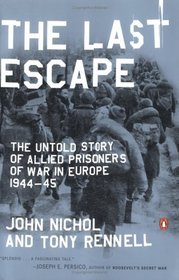Basically this book is an expose of the lack of concern the Allies had for those men who were in German POW camps. While there were some exceptions, the Allied leadership really had no plans on what to do in regards to the POWs when the end of the European conflict was in sight, although it publicly claimed otherwise, especially to the families of these POWs. And thousands of POWs died as a result. As such, this is both an heroic and sad book to read.
What really got to me was the essentially stupid behavior of the Allied bureaucracy. For example, after being freed, the POWs were paid back wages, but 10% was deducted due to the money the Germans were supposed to have paid the enlisted men who were required to work. But most of the men never saw that money. POWs were also entitled $1 for every day they were captured. But in one case a POW escaped and was free for 12 days before being recaptured. When he received his pay, he noticed $12 had been deducted. Yet, the military code of conduct urged POWs to escape.
One British POW who was elected camp leader and was responsible for saving countless lives, both in the camps and on the exhausting marches the Germans put them through, was denied high honors simply because he wasn't "of the right class." Meanwhile, an SS General was honored for supposedly saving the lives of many of the POWs, even though no POWs were ever asked to testify at his post-war trial. The authors provide proof in this book the SS General lied at his trial. You have to wonder.
Despite all this, I found the book riveting. Especially when I read about the POWs who sidestepped the military bureaucracy and either found their own way home quickly, or drifted about Europe having a good time.
But I want to know why the authors persisted in maintaining that Patton's Third Army was the first to cross the Rhine on page 201. I've seen this in other books too. Hasn't anyone heard of the Bridge at Remagen? The capture of this bridge allowed General Hodges First Army to cross the Rhine before anyone else. Hell, they even made a movie about it in 1969. So it is not like it is a secret. And this book was published in 2002.
What really got to me was the essentially stupid behavior of the Allied bureaucracy. For example, after being freed, the POWs were paid back wages, but 10% was deducted due to the money the Germans were supposed to have paid the enlisted men who were required to work. But most of the men never saw that money. POWs were also entitled $1 for every day they were captured. But in one case a POW escaped and was free for 12 days before being recaptured. When he received his pay, he noticed $12 had been deducted. Yet, the military code of conduct urged POWs to escape.
One British POW who was elected camp leader and was responsible for saving countless lives, both in the camps and on the exhausting marches the Germans put them through, was denied high honors simply because he wasn't "of the right class." Meanwhile, an SS General was honored for supposedly saving the lives of many of the POWs, even though no POWs were ever asked to testify at his post-war trial. The authors provide proof in this book the SS General lied at his trial. You have to wonder.
Despite all this, I found the book riveting. Especially when I read about the POWs who sidestepped the military bureaucracy and either found their own way home quickly, or drifted about Europe having a good time.
But I want to know why the authors persisted in maintaining that Patton's Third Army was the first to cross the Rhine on page 201. I've seen this in other books too. Hasn't anyone heard of the Bridge at Remagen? The capture of this bridge allowed General Hodges First Army to cross the Rhine before anyone else. Hell, they even made a movie about it in 1969. So it is not like it is a secret. And this book was published in 2002.





